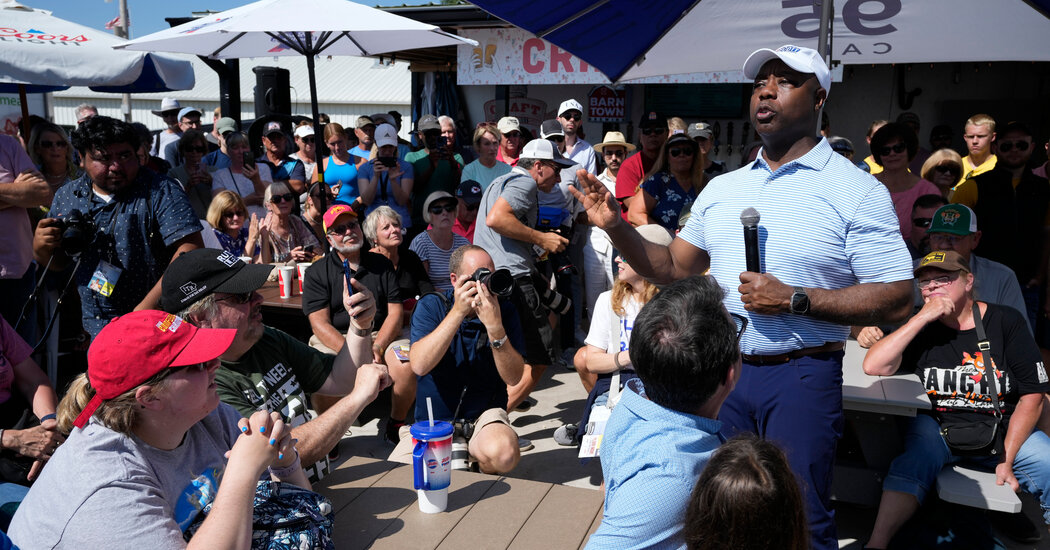Senator Tim Scott of South Carolina enjoyed on Tuesday what other candidates had missed: having the Iowa State Fair largely to himself.He shook hands,
Senator Tim Scott of South Carolina enjoyed on Tuesday what other candidates had missed: having the Iowa State Fair largely to himself.
He shook hands, tried barbecue and threw footballs with fairgoers — all a natural part of the retail politics of a presidential candidate seeking to gain standing in the first-in-the-nation caucus state. And he didn’t have to share the spotlight with rivals or hecklers.
Mr. Scott, who has made heavy media investments in Iowa, has a polished pitch that draws on a more “common sense,” optimistic message and frequently refers to his faith, a nod to Iowa’s evangelical voters. His efforts paid off on Tuesday, as he drew a crowd that was one of the largest for any of the candidates who spoke with Gov. Kim Reynolds of Iowa and was repeatedly recognized — and praised — by fairgoers.
Still, he faces an uphill battle as he seeks to propel himself from a distant third place, at best. Polls from The New York Times and Siena College this month found that he had support from 9 percent of likely Iowa Republican caucusgoers and just 3 percent of likely voters for Republican primaries nationally.
Here were five of his applause lines from Iowa on Tuesday:
“I believe America can do for anyone what she’s done for me.”
Mr. Scott has used his story — raised by a single mother, the first in his family to go to college and a career leading to Congress — as proof of his belief that race does not predetermine success or struggle. A Black man, he has told largely white Iowa audiences that their futures are not dependent on “the color of your skin,” — even as he has recounted instances of discrimination he faced — and has referred to his experiences when supporting school choice policies.
“The great opportunity party.”
Mr. Scott often invoked a rebranding of the G.O.P. when referring to what he called the achievements of the “great opportunity party.” He used the phrase when talking about speaking with people who don’t share his politics, about tax cuts and in explaining “opportunity zones” — a signature policy initiative he helped pass in Congress. That legislation allowed preferential tax treatment for investments in areas identified as economically distressed. But it is debatable whether those zones actually benefited poorer neighborhoods or instead became a means for wealthy investors to gain tax breaks on high-end projects.
“If you commit a violent crime, you go to jail.”
It’s a simple message but an effective one. When Mr. Scott started this sentence on Tuesday evening — at a dinner for the Story County, Iowa, Republican Party, several in the room finished the sentence for him as they recognized the line from his advertisements. He has used such lines to emphasize his support for “backing the blue” — another reliable, albeit mainstream, applause line — and to denounce bail abolition, “weak” district attorneys and what he called the “weaponization of race” when discussing crime.
“It is not the strength of China or President Xi. It is the weakness of President Joe Biden that is our problem.”
Though he often employed a forward-thinking approach to distinguish himself from a crowded Republican field, Mr. Scott took swipes at President Biden in particular when discussing what he called a need for the United States to “stand toe to toe with China.” He has specifically said that the United States must prevent China from “buying our farmland and stealing our jobs” — a stance that has drawn bipartisan support and speaks directly to Iowan farmers.
“I recognize that America is great because America is good, and the goodness of America can be found in the pages of our foundation, the Judeo-Christian foundation.”
Mr. Scott has frequently linked his Christianity to the optimistic pitch that is central to his strategy. He has often quoted Bible verses that support the adage to “treat others” as you “want to be treated” and the idea that “all things are possible,” explaining that he wants a president who has faith in what he says are the country’s original values.
www.nytimes.com

COMMENTS